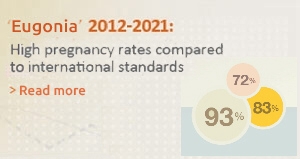The team of Eugonia published a new study suggesting that in poor responders, the use of natural cycle IVF is associated with 4 times higher probability of live birth compared with a traditional high-dose FSH antagonist protocol. This is the first study in the literature to propose that the modified natural cycle (MNC) is more beneficial in this difficult patient group since, as well as higher live birth rates, it requires minimal injections, has a significantly lower cost, is more patient friendly, and can be performed each month.Women with poor ovarian response (poor responders) have very low numbers of retrieved oocytes despite the high gonadotrophin doses employed, due to a diminished ovarian reserve (small number of resting follicles in the ovary). As a result, poor responders have lower pregnancy rates during IVF, compared to women with normal response or high response.Ovarian stimulation in these women remains a challenge for the clinician, and several studies to date have failed to agree on the optimal stimulation protocol for poor responders. Our new study proposes that MNC IVF may be the solution for these women.The study was conducted in collaboration with Aristotle University of Thessaloniki and the University of New South Wales Australia, and was published in the journal Human Reproduction. Live birth rates after modified natural cycle compared with high-dose FSH stimulation using GnRH antagonists in poor respondersLainas, T. G., Sfontouris, I. A., Venetis, C. A., Lainas, G. T., Zorzovilis, I. Z., Tarlatzis, B. C., Kolibianakis, E. M.Human Reproduction, 2015. First published online: August 25, 2015See the publication here.
Menu
- Our Unit
- Services
- In Vitro Fertilisation (IVF) - Intracytoplasmic Sperm Injection( ICSI)
- Individualised Treatment
- Oocyte Cryopreservation (Fertility Preservation)
- Genetic material donation
- Pre-implatation Genetic diagnosis and screening
- Fertilisation in Natural cycle
- Hysteroscopy - Laparoscopy
- Treatment for Ovarian Hyperstimulation Syndrome
- Infertility investigation
- Semen analysis
- Intrauterine insemination (IUI)
- Blastocyst culture
- Time-lapse technology
- Embryoglue
- Mild ovarian stimulation
- Testicular sperm extraction
- Electroejaculation
- Sperm Cryopreservation
- Embryo Cryopreservation
- Blanc (4)
- Fertility
- IVF
- Faq
- Blog
- Contact
- Menu

Eugonia - Assisted Reproduction Unit
Konstantinou Ventiri 7(HILTON), 11528 Athens
- Email: info@eugonia.com.gr
- Τel.: +30 210 723 6333
- Fax: +30 210 721 3623
About us
- Our Staff
- Our philosophy
- Our history
- Why to choose Eugonia
- Certifications
- Licence
- Our scientific work
- Our scientific publications
- Our Laboratory
- Success rates in ivf
- Our leaflet
- Our facilities and equipment
- Our achievements
- Eugonia in the Media
- Quality policy
- Our Gallery
- Testimonials
- Patient Stories
- Blanc (2)
Services
- In Vitro Fertilisation (IVF) - Intracytoplasmic Sperm Injection( ICSI)
- Individualised Treatment
- Oocyte Cryopreservation (Fertility Preservation)
- Genetic material donation
- Pre-implatation Genetic diagnosis and screening
- Fertilisation in Natural cycle
- Hysteroscopy - Laparoscopy
- Treatment for Ovarian Hyperstimulation Syndrome
- Infertility investigation
- Semen analysis
- Intrauterine insemination (IUI)
- Blastocyst culture
- Time-lapse technology
- Embryoglue
- Mild ovarian stimulation
- Testicular sperm extraction
- Electroejaculation
- Sperm Cryopreservation
- Embryo Cryopreservation
- Blanc (4)





























